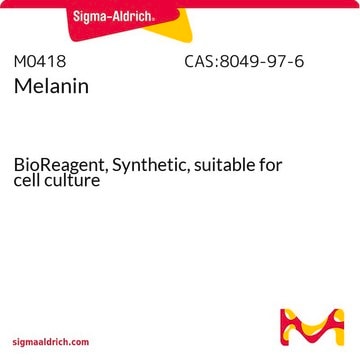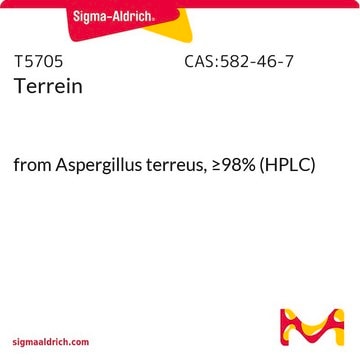Recommended Products
form
powder
storage temp.
−20°C
InChI
1S/C18H10N2O4/c1-5-13-9-7(3-19-13)12-10-8(11(9)17(23)15(5)21)4-20-14(10)6(2)16(22)18(12)24/h3-4,19-20H,1-2H3
InChI key
XUMBMVFBXHLACL-UHFFFAOYSA-N
Looking for similar products? Visit Product Comparison Guide
General description
Melanin is a vital pigment present on the surface structures of vertebrates, which contribute to skin color. It has three forms such as, eumelanin, pheomelanin and neuromelanin. Melanin has cation chelating and redox properties. It is a potent absorbent of light. Melanin functions as a chemoprotective and photoprotective pigment. Mutations in this gene are associated with oculocutaneous albinism, vitiligo, piebaldism and Waardenburg syndrome.
Application
Melanin has been used:
- in spectrophotometry
- to study its effect on reverse transcription polymerase chain reaction (RT-PCR) inhibition and effect of BSA (bovine serum albumin) in overcoming the inhibition
- as an absorber for skin layer in near-infrared tissue spectra
- Raman spectroscopy
Preparation Note
Prepared by oxidation of tyrosine with hydrogen peroxide.
Storage Class Code
11 - Combustible Solids
WGK
WGK 1
Flash Point(F)
Not applicable
Flash Point(C)
Not applicable
Personal Protective Equipment
dust mask type N95 (US), Eyeshields, Gloves
Certificates of Analysis (COA)
Search for Certificates of Analysis (COA) by entering the products Lot/Batch Number. Lot and Batch Numbers can be found on a product’s label following the words ‘Lot’ or ‘Batch’.
Already Own This Product?
Find documentation for the products that you have recently purchased in the Document Library.
Customers Also Viewed
Bovine serum albumin reverses inhibition of RT-PCR by melanin
Giambernardi TA, et al.
Biotechniques, 25(4), 564-566 (1998)
Melanin
Riley PA
The International Journal of Biochemistry & Cell Biology, 29(11), 1235-1239 (1997)
Diorders of Pigmentation
Zaidi Z, et al.
Treatment of Skin Diseases, 159-170 (2019)
Removal of analyte-irrelevant variations in near-infrared tissue spectra
Yang Y, et al.
Applied Spectroscopy, 60(9), 1070-1077 (2006)
Miguel J Beltrán-García et al.
PloS one, 9(3), e91616-e91616 (2014-03-22)
In pathogenic fungi, melanin contributes to virulence, allowing tissue invasion and inactivation of the plant defence system, but has never been implicated as a factor for host cell death, or as a light-activated phytotoxin. Our research shows that melanin synthesized
Our team of scientists has experience in all areas of research including Life Science, Material Science, Chemical Synthesis, Chromatography, Analytical and many others.
Contact Technical Service











